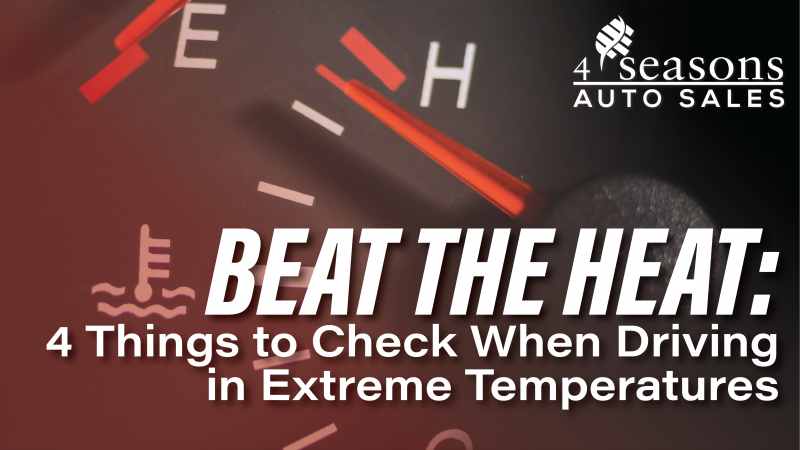
With temperatures in Utah reaching record highs this year, it’s more important now than ever to pay attention to your vehicle's needs. Listed below are a few simple things you can do to help prevent heat related damages and breakdowns this summer (and costly repairs!)
1. Check all vehicle fluids
Extreme heat can cause added stress to your vehicle’s systems. Correct fluid levels are vital if you want to make sure your car has everything it needs to keep cool and stay running correctly.
What to check:
• Coolant
• Transmission fluid
• Windshield wiper fluid
• Brake fluid
• Oil (Consider switching to a heavier viscosity motor oil during hot weather. For example instead of 5W-30, consider switching to 10W-30, 10W-40 or 20W-30. Synthetic motor oils are even better for high temperature protection.
2. Check tire pressure
4 Seasons Auto Sale’s Mechanics recommend you check tire pressure bi-weekly when there is extreme heat. For safety and longevity purposes, it is crucial to make sure you have the correct amount of air inflated in each tire. Improper tire pressure can lead to premature wear, tread separation and even blowouts.
3. Keep an eye on your temperature gauge
In the scenario that your thermometer enters the red zone or a light comes on, find a safe place to pull over. Wait until the engine has time to cool off before attempting to drive again. Driving even a short distance with an overheating engine can cause damage. Seek a trusted mechanic to help pinpoint the cause of overheating.
Shops we recommend in/near St. George, UT:• Hawker Automotive (1380 W Sunset Blvd, St. George, Utah)
• Speed Lube (435 N 1680 E #1, St. George, UT 84790 or 704 S Bluff St, St. George, UT 84770)
• Green Springs Auto (1040 W Red Hills Pkwy, Washington, UT 84780)
Shops we recommend in Cedar City, UT• MCO Tire (880 N Main St, Cedar City, UT 84721)
4. Check the age of your battery
Did you know hot weather is harder on car batteries than cold weather? Most batteries last 4-5 years. If your battery is 5 or more years old, it’s safe to assume it needs to be replaced. In many cases, you can check the age of a battery yourself. Some batteries come with a “date code”. The number indicates the year and the letter indicates the month. The character codes are interchangeable.
If there is no code on the battery, you'll need to estimate its age based on appearance. The amount of corrosion around the terminals is an indicator of age. The more corrosion, the older the battery. If you are having a hard time determining the age of the battery, stop by a trusted mechanic to test it for you. Many shops offer this service for free or at low cost.

 With temperatures in Utah reaching record highs this year, it’s more important now than ever to pay attention to your vehicle's needs. Listed below are a few simple things you can do to help prevent heat related damages and breakdowns this summer (and costly repairs!)
With temperatures in Utah reaching record highs this year, it’s more important now than ever to pay attention to your vehicle's needs. Listed below are a few simple things you can do to help prevent heat related damages and breakdowns this summer (and costly repairs!)